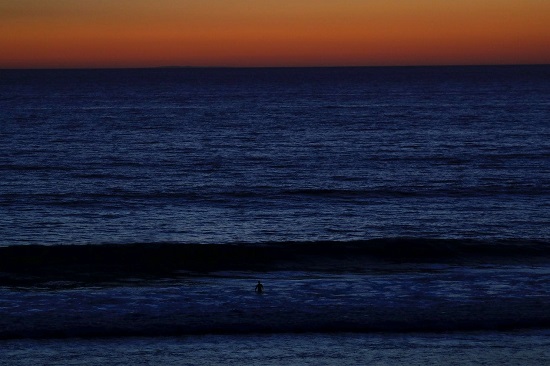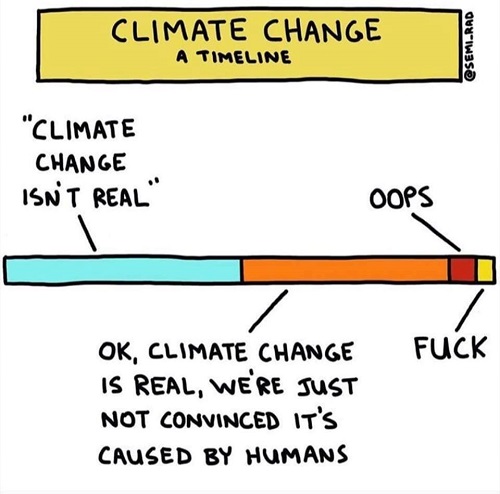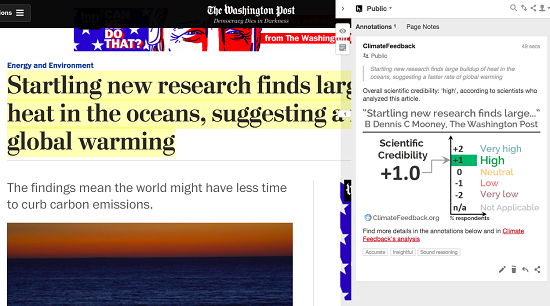2018 SkS Weekly Climate Change & Global Warming Digest #44
Posted on 4 November 2018 by John Hartz
Story of the Week... Toon of the Week... Quote of the Week... SkS in the News... SkS Spotlights... Coming Soon on SkS... Climate Feedback Reviews... SkS Week in Review... Poster of the Week...
Story of the Week...
Startling new research finds large buildup of heat in the oceans, suggesting a faster rate of global warming

A post-sunset swimmer at Moonlight Beach in Encinitas, Calif., this month. (Mike Blake/Reuters)
The world’s oceans have been soaking up far more excess heat in recent decades than scientists realized, suggesting that Earth could be set to warm even faster than predicted in the years ahead, according to new research published Wednesday.
Over the past quarter-century, Earth’s oceans have retained 60 percent more heat each year than scientists previously had thought, said Laure Resplandy, a geoscientist at Princeton University who led the startling study published Wednesday in the journal Nature. The difference represents an enormous amount of additional energy, originating from the sun and trapped by Earth’s atmosphere — the yearly amount representing more than eight times the world’s annual energy consumption.
In the scientific realm, the new findings help resolve long-running doubts about the rate of the warming of the oceans before 2007, when reliable measurements from devices called “Argo floats” were put to use worldwide. Before that, differing types of temperature records — and an overall lack of them — contributed to murkiness about how quickly the oceans were heating up.
The higher-than-expected amount of heat in the oceans means more heat is being retained within Earth’s climate system each year, rather than escaping into space. In essence, more heat in the oceans signals that global warming is more advanced than scientists thought.
Startling new research finds large buildup of heat in the oceans, suggesting a faster rate of global warming by Chris Moody & Brady Dennis, Energy & Environment, Washington Post, Oct 31, 2018
Toon of the Week...

SkS in the News...
In his Op-ed, In praise of 'real' science, published in the Times Colonist (Victoria, BC), Geof Johnson wrote:
In the online journal Skeptical Science, John Cook, a research assistant professor at the Centre for Climate Change Communication at George Mason University, writes: “The assertion that humans are, one way or another, at the root of global warming is the position of the academies of science from 80 countries.”
Quote of the Week
“We thought that we got away with not a lot of warming in both the ocean and the atmosphere for the amount of CO2 that we emitted,” said Resplandy, who published the work with experts from the Scripps Institution of Oceanography and several other institutions in the United States, China, France and Germany. “But we were wrong. The planet warmed more than we thought. It was hidden from us just because we didn’t sample it right. But it was there. It was in the ocean already.”
Startling new research finds large buildup of heat in the oceans, suggesting a faster rate of global warming by Chris Moody & Brady Dennis, Energy & Environment, Washington Post, Oct 31, 2018
SkS Spotlights...

Climate Action 100+ is a five-year initiative led by investors to engage systemically important greenhouse gas emitters and other companies across the global economy that have significant opportunities to drive the clean energy transition and help achieve the goals of the Paris Agreement. Investors are calling on companies to improve governance on climate change, curb emissions and strengthen climate-related financial disclosures.
Investor representatives from AustralianSuper, California Public Employees’ Retirement System (CalPERS), HSBC Global Asset Management, Ircantec and Manulife Asset Management have helped to lead the design and development of Climate Action 100+. The initiative is coordinated by five partner organisations: Asia Investor Group on Climate Change (AIGCC); Ceres; Investor Group on Climate Change (IGCC); Institutional Investors Group on Climate Change (IIGCC); and Principles for Responsible Investment (PRI). It builds on the successful investor engagement programmes coordinated by the partner organisations over a number of years.
Coming Soon on SkS...
- How (not) to talk about climate change (Climate Adam)
- Climate sensitivity uncertainties leading to more concern (Greenman)
- Climate change science comeback strategies: 'In it for the money' (Karin Kirk)
- What the US midterm election means for climate change (Dana)
- New research this week (Ari)
- 2018 SkS Weekly Climate Change & Global Warming News Roundup #45 (John Hartz)
- 2018 SkS Weekly Climate Change & Global Warming Digest #45 (John Hartz)
Climate Feedback Reviews
Washington Post accurately describes ocean warming study with potential implications for future carbon budget

Climate Feedback asked a team of scientists to analyze the article, Startling new research finds large buildup of heat in the oceans, suggesting a faster rate of global warming by Chris Moody & Brady Dennis, Energy & Environment, Washington Post, Oct 31, 2018
Three scientists analyzed the article and estimate its overall scientific credibility to be 'high'.
A majority of reviewers tagged the article as: Accurate, Insightful, Sound reasoning.
Review Summary
This article in The Washington Post covers a new study estimating the amount of heat energy that has accumulated in the ocean in recent decades. Such estimates have been limited because the most complete network of ocean temperatures did not exist until the 2000s. The new study uses an indirect method, instead relying on changes in atmospheric gases caused by warmer oceans. This method leads to a larger estimate of the ocean warming that resulted from human activities.
Scientists who reviewed the article found that it did a good job of describing the study, while noting that the study’s conclusions (and implications) require additional investigation. In particular, discussion among scientists has focused on clarifying what impact this study’s results have on our understanding of climate sensitivity (how much warming occurs from a given amount of greenhouse gas emissions) and, consequently, how much the world can emit before reaching 2 °C warming.
Washington Post accurately describes ocean warming study with potential implications for future carbon budget, Edited by Scott Johnson, Climate Feedback, Nov 3, 2018
SkS Week in Review...
- 2018 SkS Weekly Climate Change & Global Warming News Roundup #44 by John Hartz
- New research, October 22-28, 2018 by Ari Jokimäki
- Climate impacts, Guest Post by And Then There's Physics (ATTP)
- China's Greenhouse Gas Emissions by Riduna
- A eulogy to Guardian's Climate Consensus - the 97% by Dana1981
- Canada passed a carbon tax that will give most Canadians more money by Dana Nuccitelli (Climate Consensus - the 97%, environment, Guardian)
- 2018 SkS Weekly Climate Change & Global Warming Digest #43 by John Hartz
Poster of the Week...
































 Arguments
Arguments






























Well, Well! It seems that the SkS "myth" titled Temp record is unreliable is really not a myth at all according to the third paragraph which states:
In the scientific realm, the new findings help resolve long-running doubts about the rate of the warming of the oceans before 2007, when reliable measurements from devices called “Argo floats” were put to use worldwide. Before that, differing types of temperature records — and an overall lack of them — contributed to murkiness about how quickly the oceans were heating up.
So despite the fact since the 1980s, the AGW community has preached the importance of heeding the "experts" with their "overwhelming evidence" and 97% consensus about human-caused global warming, reliable temperature measurements did not exist before the year 2007. This is by their own statements and not those of the contrarions. Therefore, the science concerning climate change is not settled and it would be grossly unethical to impose more taxes and regulations on the citizens of any nation under the pretense of saving the planet from AGW. This is especially true considering the fact that despite all of this global warming, people in the northeastern and midwestern US have seen record low temperatures for the past three or four winters. They simply cannot afford another tax on top of their already high heating bills.
[JH] Sloganeering snipped. By the way, the heat content of the ocean is an entirely different subject matter than the temperature of the atmosphere at the surface of the Earth. You can use this site's Climate Science Glossary to learn what each term means.
Please note that posting comments here at SkS is a privilege, not a right. This privilege can be rescinded if the posting individual treats adherence to the Comments Policy as optional, rather than the mandatory condition of participating in this online forum.
Please take the time to review the policy and ensure future comments are in full compliance with it. Thanks for your understanding and compliance in this matter.
JayCharles,
The global surface temperature record is the 'Temperature Record' addressed by the SkS myth debunking item you refer to.
The ocean heat content is a related matter. However, any correction or new learning regarding ocean heat content would not change the global average surface temperature data.
I hope that helps you better uderstand this issue.
What is undeniably unethical is for a portion of any current generation of humanity to personally benefit from an unsustainable activity that undeniably harms others, particularly an activity that harms future generations (generations that will not be able to continue to benefit from the activity because it is unsustainable - the burning of buried ancient hydrocarbons has a finite future).
Gradually making the unacceptable activity more expensive, a progressively increased fee on the carbon, is actually a slower correction of the harmful activity than the future generations would prefer to see. It is an action that makes the harm to future gemerations larger than it would be if more aggressive corrective actions were implemented.
And the longer and slower the correction is, the more jarring a future desperate correction may need to be, with even more future harm done. Especially if global geo-engineering action is thought to be the way to address a future emergency that was avoidable, but was not avoided because so many people in the previous generations had developed a powerful greedy resistance to being corrected.
And the less fortunate do need to be helped, but excusing fossil fuel burning is not helpful.
[DB] The poster you refer to is one of 3 dozen fake account sock puppets run by user "cosmoswarrior". No further responses to it are warranted, as it's sole purpose for existence is to waste the time of as many as possible, for as long as possible.
It's posting privileges have been revoked (like all that came before it), as will those of future similar, ignorant iterations.
Regarding the media releases on this study and disregarding the fact that ocean temperature rise and atmospheric rise are in fact linked (are they not?) I came across this : https://judithcurry.com/2018/11/06/a-major-problem-with-the-resplandy-et-al-ocean-heat-uptake-paper/
In that paper, a mathematician/physicist/financier turned climate "skeptic" posted a mathematical analysis in which just some basic division was in error on the first page of a peer reviewed and approved Nature article that subsequently made huge headlines. However, not so much on the correction of the paper. I found that surprising. I was, perhaps incorrectly, under the assumption that part of the peer review process would include a double check on the maths involved - especially for a paper that may potentially revise multiple studies done before it, to the point where the previous papers would have been an epic miscalculations and the results imperiling the drive towards action on the issue of carbon pollution.
I believe the evidence (that I am capable of understanding) that climate change is happening. Personal experience within my lifetime, some basic chemistry and physics knowledge, and a strong interest in the subject (I am human and have a child that I would like to have live in a climate-stable world).
However, the fact that a very simple division calculation was skipped over in the peer review process troubles me. So my question is, since I am ignorant of the total body of the researchers involved, are there also teams of mathematicians whose job it is to help interpret calculable risks, projections, and also some basic maths checking of the results of climate scientists (in whatever specialized fields that umbrella covers)?
If so, is there a (set of) resource(s) for their interpretations?
If not - why not?
I also note that it was stated above that "Three scientists analyzed the article and estimate its overall scientific credibility to be 'high'".
When can the public expect to start seeing "scientists AND mathematicians analyzed" these issues and calculations - hopefully BEFORE being released to the major news media so that the waters don't get even more muddied than they already are? With all due respect to these scientists and their areas of expertise, their maths seem to be a little less developed.
[JH] You have conflated the peer review process of the paper, Quantification of ocean heat uptake from changes in atmospheric O2 and CO2 composition and the Climate Feedback review of Chris Mooney's article about the paper. The two processes are quite distinct and should not be mushed together.
The final paragraph of your comment constitutes sloganeering and has been snipped. Sloganeering is prohibited by the SkS Comments Policy.
LaymanSC:
As detailed in the below article, the authors of the paper, Quantification of ocean heat uptake from changes in atmospheric O2 and CO2 composition have made corrections to it. This incident is a good example of the self-correcting nature of the scientific process. When mistakes are discovered, they are acknowledged and corrected in a very transparent manner.
There is further article here on RealClimate from one of the authors (who takes the blame for the error). A correction has been submitted to the journal. Science working as per usual as opposed to how the misinformation providers do things. Hopefully the conclusions of the corrected paper will not be lost in the noise, but I am not holding my breath. I suspect there will be a substantial number on deniers who believe that all the science is wrong and it is just that noone has found the errors yet.
LaymanSC @3 , the matter of the oceanic warming paper (by Resplandy et al) which you mention, has turned out to be a storm in a teacup.
And the paper's criticism by Nic Lewis is also a storm in a teacup.
You are wrong to imply that Lewis sometime had a Damascene Conversion to "turn skeptic" ~ he is no such animal, no such converter. He was always a science "denialist", AFAICT from reading his various posts & articles on the Judith Curry blog. A denialist is someone who fails to follow the scientific process of objective assessment, but who allows his bias/emotions [by means of motivated reasoning] to impel him in the direction he wishes to go. Lewis in an intelligent and educated fellow ~ yet he bends over backwards to minimize the size of that important matter, Climate Sensitivity to CO2. But please note that he is not one of the usual denialist crazies who deny the actual basic science involved in AGW ~ yet it seems clear that he has a similar psychological motivation as some of the crazies (but he does not overtly express conspiracy theories & Socialist World Government fears).
The end result : is that the Resplandy paper presented a clever novel way of assessing global warming . . . clever and novel enough to impress the paper's initial reviewers. The Resplandy paper indicated the global warming rate to be worryingly worse than the mainstream scientific opinion.
However, it seems now (provisionally) that the "fuzziness" of the Resplandy assessment is large enough [as discovered and pointed out by Lewis] to render the paper to be of little utility in quantifying climate sensitivity. So we go back to the status quo. And the views held by Lewis and Curry are still wrong ~ still outliers, unsupported by the generality of scientific evidence.